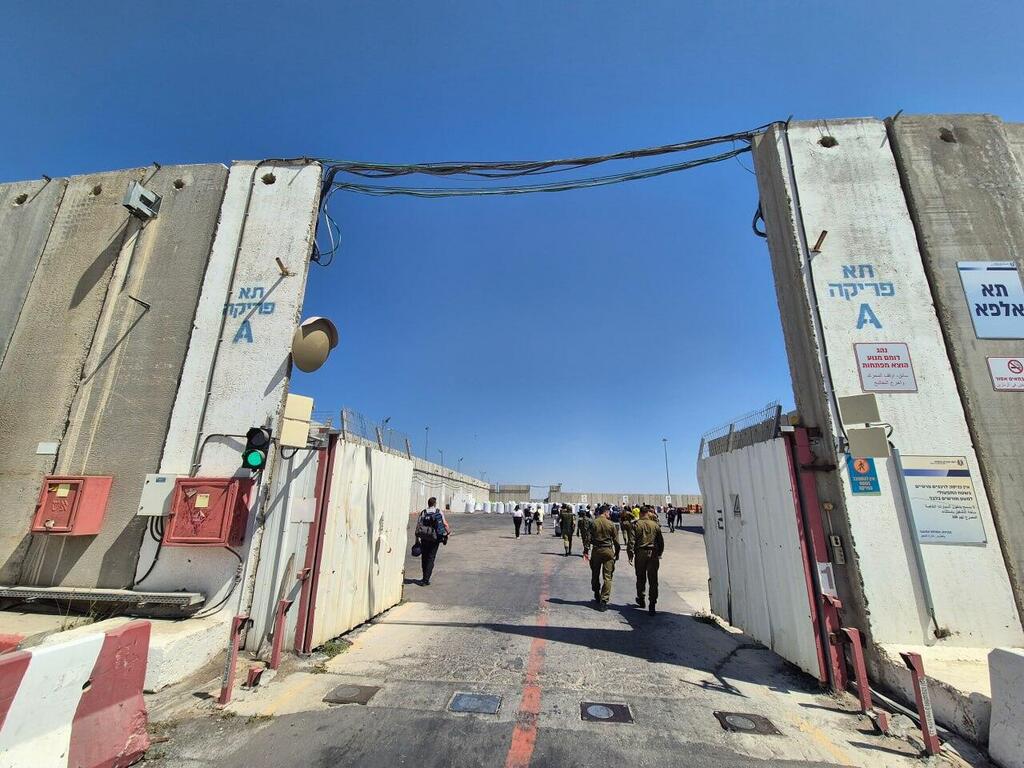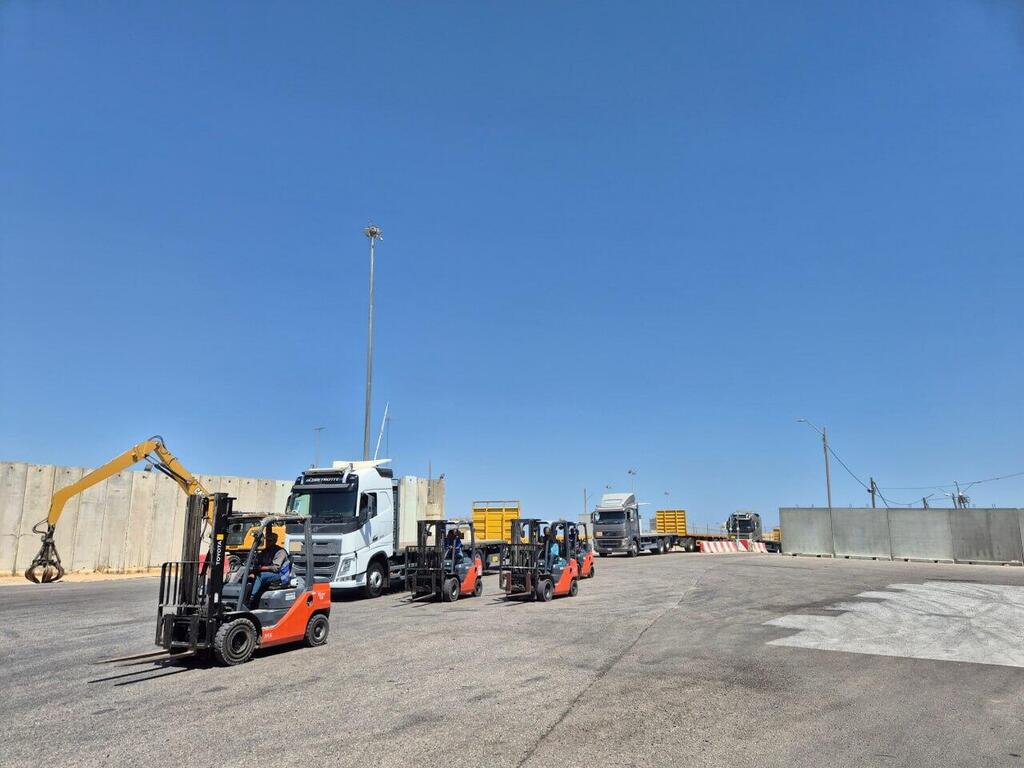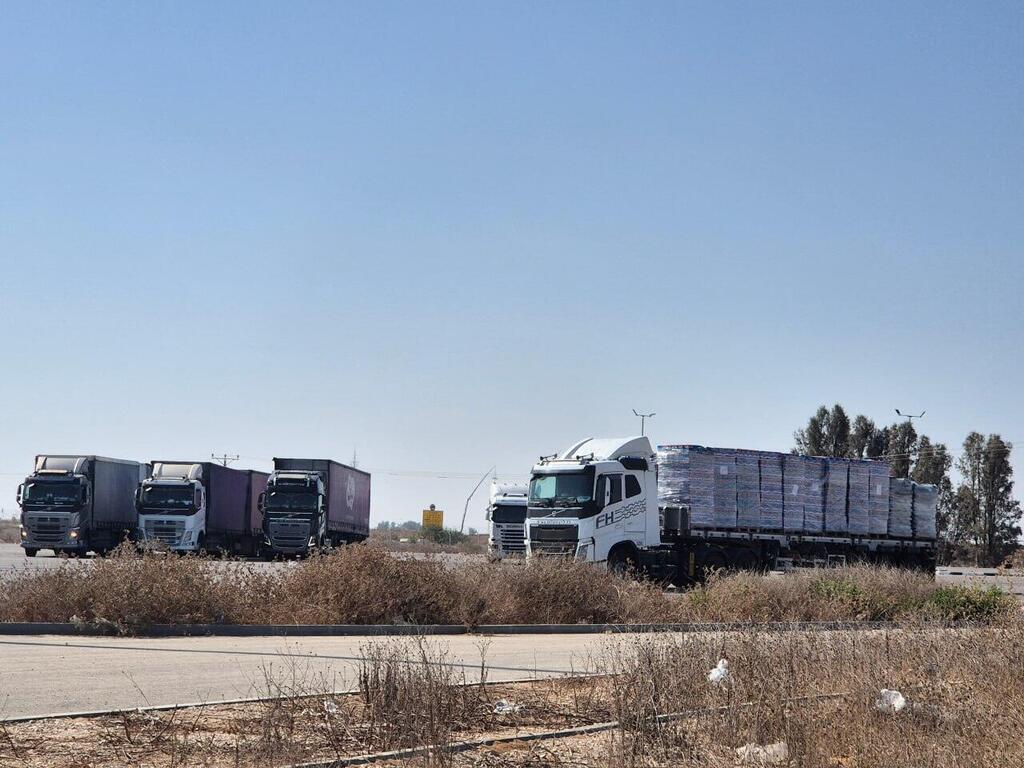Getting your Trinity Audio player ready...
Multiple trucks and forklifts carry loaded pallets as an excess of backed-up supplies waits to be distributed to Gazan civilians in need. This is the Kerem Shalom Crossing, a small maze of tall concrete walls and gates connecting two large parking lots for loading, unloading, and maneuvering trucks on each side. While IDF units work to keep security, dozens of civilians provide logistical services to bring in food, water, medicine, shelters, and much more.
The halted abundance of goods in Gaza has been making headlines globally as countries blame Israel for a ‘famine’ the Jewish state emphatically denies. Despite multiple warnings made by the UN a few months ago that famine was imminent in Gaza, today, it’s clear there is no famine. However, much of the world still believes that Israel is attempting to starve civilians in Gaza when, in fact, the IDF is doing the opposite.
In a briefing with journalists at the Kerem Shalom Crossing, Colonel Elad Goren, head of the Civil Affairs Department at COGAT (Coordination of Government Activities in the Territories), outlined Israel's ongoing humanitarian efforts in the Gaza Strip amid the current conflict.
“Today, we are dealing with the logistical difficulties of the UN in carrying out its role of collecting and distributing the aid from the Palestinian side of Kerem Shalom and distributing it inside the Gaza Strip,” Goren stated. “The aerial route, around 10,000 food packages have been airdropped in more than 120 airdrop operations by various countries.”
Additionally, Goren claimed that, since the floating pier constructed by United States military forces began operation in early May, over 10,000 pallets have been distributed by 747 trucks.”
“In addition, the land crossings can handle 500 trucks daily. However, in practice, the average number of trucks has only been 250 per day over the last several weeks.” However, Goren stressed that, “This has not been the result of an Israeli decision.”
“We are not involved in decisions affecting the amount of aid, quality, or prioritization. This is all in the hands of the UN aid agencies operating in the Gaza Strip. They will decide how many trucks they want to bring and which kind, whether fuel, aid, or food.”
Goren also made the claim that “around 14,000 trucks with aid have entered Gaza, carrying more than 700,000 tons of food, medical supplies, shelter materials, infrastructure equipment, fuels, and more” adding, “These are not numbers that the UN presents.”
“The UN speaks of 26,000 trucks, which means there is a 50% gap between the numbers that we know and the numbers that the UN presents. Why is this? Because the UN does not consider all the aid channels, such as the Merza Routes and the Erez Crossing.”
In context: The Kerem Shalom Crossing, situated at the junction of the Gaza Strip, Israel, and Egypt, is a vital border crossing for transferring goods and humanitarian aid into Gaza. Amid ongoing conflicts and blockades, it plays a crucial role in supplying food, medicine, and other essential materials to Palestinian civilians. Heavily secured by the IDF to prevent smuggling, the crossing is central to international humanitarian efforts and security operations. Its efficient functioning is essential for delivering aid while addressing Israel's security concerns, making it a focal point in diplomatic and logistical discussions. In November 2023, the crossing gained further significance when 13 hostages were freed from Hamas captivity in Gaza and brought to safety through this route.
'The United Nations has said no starvation'
During the briefing, Colonel Goren highlighted four major issues, with the first being the need for “concrete steps and mechanisms to open up the bottlenecks for the goods awaiting collection and distribution on the other side of Kerem Shalom Crossing. What good would we do if we sent more trucks to the other side, scanned more trucks to move them to the Palestinian side of Kerem Shalom, and no one could pick them up and distribute them inside Gaza?”
“Second, to improve the medical response in the Gaza Strip, both in terms of local and external capabilities. Third, to improve all aspects of sanitation, including sewage, wastewater, and clean water. Fourth, facilitating movement within the Gaza Strip will make it possible for humanitarian organizations to operate safely inside Gaza,” Colonel Goren explained.
“There are five points through which aid can enter the Gaza Strip,” Goren said. “Kerem Shalom, Crossing 96, Erez East, Erez West, and the Maritime Route with the floating pier that the Americans operate. While this is the largest number of entry points to Gaza, the UN is not increasing its capabilities. I repeat: The crossings can move more goods. We can scan more trucks.”
“We can move more aid into Gaza. This is not the bottleneck. Israel and the security screenings are in no way the obstacle to humanitarian aid entering Gaza. We are enabling it. We are facilitating it.”
“I think it's safe to say, and even United Nations reports have come out, that there is no starvation in Gaza.”
According to Goren, UN experts have said that Gaza needs between 500 trucks of supplies daily; however, “the average number of trucks has only been 250 per day. This has not been the result of an Israeli decision. We are not involved in decisions affecting the amount of aid, quality, or prioritization. This is all in the hands of the UN aid agencies operating in the Gaza Strip.”
He noted that when it comes to medical response, “Israel isn't controlling any of the hospitals. What we are doing is coordinating The setup of 11 field hospitals. We're allowing the cross of medicines and fuel as they are a significant part of humanitarian aid. These trucks can't move without fuel. Trucks inside Gaza need to be able to move around. If they're not going to be able to move around, then they're not going to bring aid to anyone.”
“We're cognizant of that. We're well aware of the fact that this is a necessary thing, and we're actually bringing in fuel. I don't know many countries bringing fuel to their enemy territory.”
Major David Baruch from the IDF Spokesperson unit reiterated that there is no truth to the claim of an Israel-produced famine in the Gaza Strip, telling The Media Line, “I think it's safe to say, and even United Nations reports have come out, that there is no starvation in Gaza.”
“Months ago, already came in reports saying that there was going to be starvation. There's going to be a serious humanitarian issue. Life cannot be easy. I'm sure this is a war zone. It's not easy. Yet, there's no starvation. The United Nations has said no starvation. So that's a big if you want to put it win for us, but that's not enough. Hamas is only interested in their suffering.”
Baruch explained to TML how Hamas is fighting to provoke a humanitarian crisis in Gaza and how the IDF is successfully avoiding it.
“Going into Rafah is to get to the Hamas fighters to get to their supply lines…which still may be coming through the tunnels that we haven't yet uncovered, and we're uncovering them all the time and obviously also in search of some of our hostages still being held there.”
“There is a chance that tunnels connecting the Gazan side to Egypt are still operating. I don't know how many if there are any more.”
According to him, since the beginning of the war, in terms of supplies, Kerem Shalom “is the largest of all routes going into Gaza. We're 278 days into this war since Hamas came over and attacked right here.”
“There is well over a month's worth of humanitarian aid waiting to be taken by international organizations, whether the United Nations or other organizations, to get the food and medicines to the people who really need them over there,” Major Baruch told The Media Line.
“Hamas is trying to control everything that happens in there. We have to remember they were. They were a type of dictatorship, a totalitarian regime, while they were in control when they took over in 2007,” he reminded.
“Our goal in this war, after we were attacked, we decided not only do we have to first and foremost to bring back those remaining hostages that were taken. There are still 120 (hostages) waiting to come home. But (our goal is) also to destroy Hamas and its ability to ever govern in Gaza and to do an attack on us, like they did on the 7th of October.”
“If they can’t control it, they’re trying to keep it away from those who need it. Because in their eyes, every innocent Palestinian who is hurt or in need of something is a great picture that works to Hamas’ advantage,” he added.
“We’re coordinating with the UN and other international organizations who are moving in the humanitarian aid to areas they deem necessary. We’re coordinating the routes, their schedules, and their trucks. We’ve put in place operational pauses in our fighting in order to allow for these things to happen as well,” Major Baruch concluded.
In response to the claims made by the IDF and COGAT, UN spokesperson Stephane Dujarric told reporters on Friday, "Yes the aid is being dropped off. But on the other side of that you have utter lawlessness, plus you have continuing conflict.”
“We are continuing to do our best to get that to those people who need it. Our colleagues in Gaza are not sitting on their hands.”
- The story is written by Nathan Klabin and Dario Sanchez and reprinted with permission from The Media Line.





